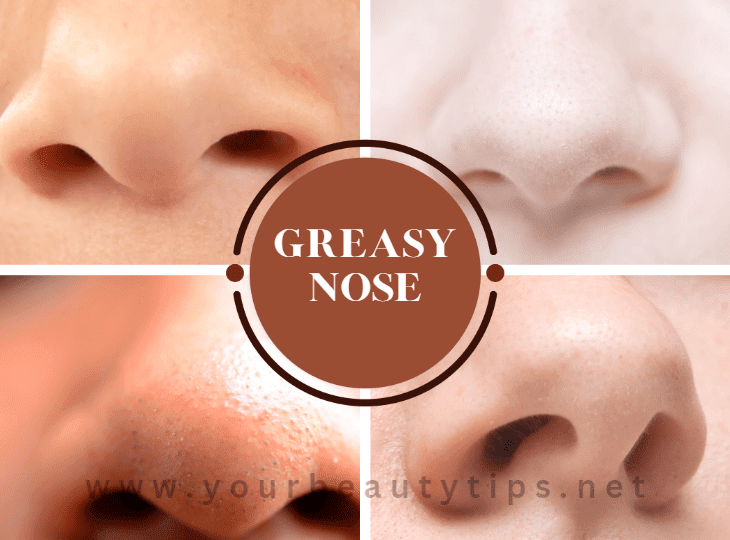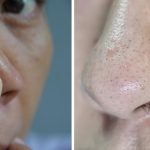What Exactly is a Greasy Nose?
A frequent condition known as a “greasy nose” causes the skin on and around the nose to appear oily or greasy. Sebum, a natural oil produced by the sebaceous glands in the skin, is frequently connected to this illness. The buildup of oil on the face caused by excessive sebum production can give the nose an oily, shiny appearance.
Why Does My Nose Feel Greasy?
Genetics, hormonal changes, dietary factors, stress, and some medications are just a few of the causes of a gritty nose. Individuals with oily skin, acne, or other skin problems that affect oil production are more prone to have greasy noses.
A skin condition called oily skin or a gritty nose is brought on by the sebaceous glands’ excessive sebum production. Natural oil known as sebum serves to preserve and moisturise the skin. However excessive sebum production can result in an oil accumulation on the skin, giving the nose and other parts of the face a shiny, greasy, and occasionally even acne-prone appearance.
While having oily skin might be annoying, it is important to remember that it is not always a bad thing. Oily skin may be less prone to wrinkles and fine lines and is frequently better protected against environmental deterioration.
Sebum production that is out of control and greasy noses can result from a number of conditions, including:
- Genetics: Parents may pass on to their offspring an inherited tendency for oily skin.
- Hormone Changes: The production of sebum can be impacted by hormonal changes associated with puberty, menstrual cycles, and pregnancy.
- Diet: Eating a diet rich in fats, sweets, and processed foods may cause the sebum to produce too much.
- Environmental Factors: Environmental factors can cause a greasy nose, including pollution, harsh chemicals, and hot, humid conditions.
Ineffective Skincare Regimen: Employing products that are overly abrasive or unsuitable for your skin type, or improperly removing makeup, can also result in an overproduction of oil on the skin.
What Annoyances Does a Greasy Nose Bring About?
Some people find it very frustrating to have a gritty nose. An oily nose might lead to the following issues.
Acne: The development of acne is significantly influenced by oily skin. Excess oil on the skin can block pores and provide the perfect habitat for the development of acne-causing bacteria when combined with dead skin cells and other debris. Blackheads, whiteheads, and pimples may develop as a result, which can be uncomfortable, ugly, and challenging to treat.
Enlarged Pores: Little openings in the skin called pores allow perspiration and oil to exit. But excessive oil production can expand the pores, making them more noticeable and giving the skin a harsh or uneven texture. Blackheads and other forms of acne can also be facilitated by enlarged pores.
Shiny Appearance: As oil builds up on the skin, it can give off a shiny or greasy appearance that is unappealing and can lower one’s self-esteem. In social or professional settings where a polished appearance is needed, this can be particularly challenging.
Issues With Makeup: Oily skin can make it harder to apply makeup smoothly and also hasten its fading. Those who enjoy wearing cosmetics or who depend on it in their personal or professional lives may find this upsetting.
Skin Irritation: If strong or abrasive products are used to treat oily skin, it may be more susceptible to irritation. Redness, itching, and other discomforts that can be challenging to control might result from this.
Infections: In rare instances, an accumulation of oil on the skin can foster the growth of bacteria and fungi, resulting in skin diseases. Those with compromised immune systems or those who suffer from other skin disorders that affect the skin’s barrier defense are more likely to experience this.
How Do I Treat a Greasy Nose?
It’s crucial to take precautions to keep the skin clean, moisturised, and protected if you want to control a greasy nose. This can involve avoiding harsh or abrasive products, using gentle cleansers and moisturisers designed for oily skin, and taking measures to reduce oil buildup during the day. It is possible to minimize the harmful consequences of a greasy nose and keep healthy, appealing skin with the right maintenance. There are various skincare regimens and treatments available to help manage oily skin, though, if it’s making you uncomfortable or lowering your self-esteem.
Here Are Some More Thorough Suggestions for Eliminating an Oily Nose
- Choose the Right Cleanser: Using a mild cleanser that is designed for oily skin is the first step in managing a greasy nose. For products that are “for oily skin,” “non-comedogenic,” or “oil-free,” look for these labels. Avoid using abrasive or strong cleaners since they might strip the skin of its natural oils and trigger an increase in oil production.
- Wash Your Face Twice a Day: Removing extra oil, grime, and debris from the skin with regular face washing can assist. Massage your skin for 30 to 60 seconds with lukewarm water and a mild cleanser, then thoroughly rinse and towel dry.
- Exfoliate Regularly: Exfoliate frequently to help remove dead skin cells and unclog pores, which will help your nose look less greasy. Depending on how sensitive your skin is, use a light exfoliating scrub or chemical exfoliator once or twice a week. Avoid over-exfoliating since this might irritate the skin and exacerbate the issue.
- Use Creams and Moisturisers Without Oils: Your skin still needs to be moisturised even if it is greasy. Seek for oil-free, lightweight moisturisers that won’t clog your pores or cause an oily skin buildup. Use items marked “for oily skin,” “non-comedogenic,” or “oil-free.”
- Use Blotting Papers or Powder: These products can assist in absorbing extra oil throughout the day, decreasing shine and preventing buildup. To keep your skin looking fresh, gently blot it with blotting paper or lightly dust your T-zone (forehead, nose, and chin) with powder.
- Avoid Touching Your Face: Touching your face might cause an oily nose to get worse by transferring oils and bacteria from your fingertips to your skin. As much as you can, try not to touch your face, and always wash your hands well before using any skincare products.
- Employ Targeted Acne Treatments: If you have skin that is prone to breakouts, utilizing a targeted acne treatment can help to fade existing blemishes and stop the formation of new ones. To prevent irritation, look for products that contain salicylic acid, benzoyl peroxide, or retinoids, and be sure to carefully follow the directions.
- Contact a Dermatologist: If having a greasy nose is interfering with your life or giving you substantial distress, a dermatologist can help you identify any underlying skin concerns and suggest a course of action. Also, they might be able to recommend more potent therapies or medications to assist manage the issue more successfully.
Keep in mind that treating an oily nose involves persistence, patience, and constant work over time. Be gentle with your skin and stay away from using harsh or abrasive products because it could take some trial and error to find the products and routine that work for you. You can lessen the look of a greasy nose and keep healthy, radiant skin with the proper care and attention.
You Can Check It Out to Oily Nose




